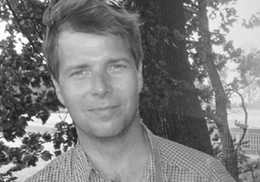|
 |
Bartosz Andrzej Grzybowski
Distinguished
Professor, Department of Chemistry, UNIST Director, Center for Algorithmic and Robotized Synthesis (CARS), Institute for Basic Science |
|
HIGHLIGHTS OF SCIENTIFIC CONTRIBUTIONS | | | Prof. Bartosz Grzybowski is one of the global pioneers of computational synthesis planning and applications of chemical AI in the discovery of new functional molecules and materials. He has also made fundamental contributions to the theory of chemical reaction networks, dynamic/non-equilibrium self-assembly, nanoscience, and surface phenomena. He and his team published over 300 articles including 18 in Nature and Science, world's most prestigious academic journals; according to Google Scholar these works have been cited over 40,315 times. For his achievements, Grzybowski has been awarded multiple awards including the Nanoscience Prize ('13), on this Feynman Prize ('16), and on this FNP Award ('22), and was elected a Fellow of the Royal Society of Chemistry in 2015. Prof. Grzybowski serves as a Scientific Advisory Board member to the Organization for the Prohibition of Chemical Weapons in the Hague and is on the advisory boards of several academic journals. In 2019, he was invited to lecture at the on this Solvay Conference, one of the world's premier venues for physics and chemistry, and in 2023 gave a plenary lecture at the IUPAC World Congress on Chemistry. CARS, the IBS Center for Algorithmic and Robotized Synthesis, led by Director Grzybowski, aims to revolutionize and accelerate molecular-scale synthesis with the help of AI algorithms and chemical robotics. |
EDUCATION AND ACADEMIC EXPERIENCE |
|
|
6/1995 |
B.S., Chemistry, Yale University, New Haven, CT |
|
6/1995 |
M.Sc., Chemistry, Yale University, New Haven, CT |
|
11/2000 |
Ph.D., Chemistry, Harvard University, Cambridge, MA |
|
10/2000-7/2001 |
Postdoctoral Fellow, Harvard University |
|
7/2001-8/2003 |
Director of Research, Vitae Pharmaceuticals and Associate of the Department of Chemistry and Chemical Biology, Harvard University |
| 9/2003-8/2007 |
Assistant Professor,
Northwestern University, Department of Chemical and Biological Engineering and Department of Chemistry |
|
9/2007-8/2009 |
Associate Professor,
Northwestern University, Department of Chemical and Biological Engineering and Department of Chemistry |
|
9/2009-12/2014 |
Director of the DoE Energy Frontier Research Center (Non-Equilibrium Energy Research Center, Northwestern
University) |
|
9/2009-12/2014 |
Full Professor, Kenneth Burgess Chair in Physical Chemistry and Chemical Systems Engineering, Department of Chemical and Biological Engineering and Department of Chemistry |
|
9/2014-present |
Professor, Polish Academy of Sciences |
|
12/2014-present |
Distinguished Professor of Chemistry, UNIST |
|
7/2015-present 5/2023-12/2023 1/2024-present |
Group Leader, IBS Center for Soft and Living Matter @ UNIST Acting Director, IBS Center for Soft and Living Matter @ UNIST Director, IBS Center for Algorithmic and Robotized Synthesis @ UNIST |
HONORS AND AWARDS |
|
|
Arthur Fleischer Award for Outstanding Performance in Chemistry, Yale University (1995) |
|
Honoris in Chimia, Yale University (1995) |
|
Summa cum Laude, Yale University (1995) |
|
Camille and Henry Dreyfus New Faculty Award (2003) |
|
National Science Foundation CAREER Award (2006) |
|
3M Non-Tenured Faculty Award (2006) |
|
Pew Scholar in the Biomedical Sciences (2006) |
|
American Chemical Society Division of Colloid and Surface Chemistry Unilever Award (2006) |
|
Sloan Fellowship (2007) |
|
Camille Dreyfus Teacher-Scholar Award (2007) |
|
G.Kanig Award for Innovation (Verband für Polymerforschung, Germany) (2008) |
|
Soft Matter Lecturership (Royal Society of Chemistry, UK) (2010) |
|
Saville Lecturership (Princeton University) (2010) |
|
Crano Distinguished Lectureship (American Chemical Society, Akron Section) (2010) |
|
American Institute of Chemical Engineers NSEF Young Investigator Award (2010) |
|
Centennial Year of Chemistry Distinguished Lecture (Wroclaw University, Poland) (2011) |
|
Excellence in Nanoscience Lectureship (EPFL, Switzerland) (2012) |
|
MESA Institute Annual Lecture (University of Twente, the Netherlands) (2012) |
|
ISIS Distinguished Lectureship (University of Strasbourg, France) (2012) |
|
Nanoscience Prize (International Society for Nanoscale Science, Computation and Engineering) (2013) |
|
The Givaudan Lecture and the Bristol Synthesis Meeting (2014) |
|
Fellow of the Royal Society of Chemistry (2015) |
|
The Feynman Prize in Nanotechnology (2016) |
|
WuXi Distinguished Lecturer (Shanghai, China) (2018) |
|
Sendzimir Honorary Medal (Society of Innovators, Poland) (2019) |
|
25th Solvay Conference on Chemistry (Brussels, Belgium) (2019) |
|
NIH NCATS "Aspire" Award (National Institutes of Health, NIH, Washington, USA) (2019) |
|
Elected Member of the Societas Scientarum Varsaviensis (Towarzystwo Naukowe Warszawskie) (2020) |
|
AbbVie Discovery 2021 Platform Chemistry Technology Seminar (2021) Grand Academic Award (Academic Affairs Team, UNIST) (2020) FNP Prize (Foundation for Polish Science) (2022) Bowei Research Conference Lecture (Kending, Taiwan) (2023) Solvay Workshop on Chemistry (Brussels, Belgium) (2023) IUPAC Plenary Lecture (The Hague, The Netherlands) (2023) Plenary lecture and award at V National Inorganic Chemistry Forum (Poland) (2025) |
|